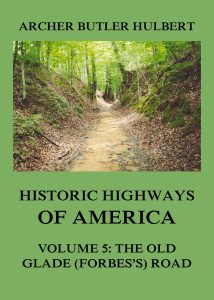Historic Highways of America: Volume 5: The Old Glade (Forbes’s) Road – Archer Butler Hulbert.
A series of monographs on the History of America as portrayed in the evolution of its Highways of War, Commerce, and Social Expansion. Comprising the following volumes:
Paths of the Mound-Building Indians and Great Game Animals.
Indian Thoroughfares.
Washington’s Road: The First Chapter of the Old French War.
Braddock’s Road.
The Old Glade (Forbes’s) Road.
Boone’s Wilderness Road.
Portage Paths: The Keys of the Continent.
Military Roads of the Mississippi Basin.
Waterways of Westward Expansion.
The Cumberland Road.
Pioneer Roads of America (two volumes).
The Great American Canals (two volumes).
The Future of Road-Making in America.
Forbes’s road, fortified at Carlisle, Shippensburg, Chambersburg, Loudon, Littleton, Bedford, Ligonier, and Pittsburg became the great military route from the Atlantic seaboard to the trans-Allegheny empire. By it Fort Pitt was relieved during Pontiac’s rebellion and the Ohio Indians were brought to terms. Throughout the Revolutionary War this road was the main thoroughfare over which the western forts received ammunition and supplies. In the dark days of the last decade of the eighteenth century, when the Kentucky and Ohio pioneers were fighting for the foothold they had obtained in the West, this road played a vital part.
Format: Paperback.
Historic Highways of America: Volume 5: The Old Glade (Forbes’s) Road.
ISBN: 9783849674885.
Available at amazon.com and other venues.
Historic highways in the United States (from Wikipedia):
The history of America in the later part of the pioneer period, between 1810 and 1840, centers about the roads and canals which were to that day what our trunk railway lines are to us today. The ” life of the road ” was the life of the nation, and a study of the traffic on those first highways of land and water, and of the customs and experiences of the early travelers over them brings back with freshening interest the story of our own ” Middle Age.” Horace Bushnell well said: ” If you wish to know whether society is stagnant, learning scholastic, religion a dead formality, you may learn something by going into universities and libraries; something also by the work that is doing on cathedrals and churches, or in them; but quite as much by looking at the roads. For if there is any motion in society, the Road, which is the symbol of motion, will indicate the fact. When there is activity, or enlargement, or a liberalizing spirit of any kind, then there is intercourse and travel, and these require roads. So if there is any kind of advancement going on, if new ideas are abroad and new hopes rising, then you will see it by the roads that are building. Nothing makes an inroad without making a road. All creative action, whether in government, industry, thought, or religion, creates roads.” The days when our first roads and our great canals were building, were days when ” new ideas were abroad and new hopes rising.” The four volumes of our series treating of pioneer roads and the great canals will be a record of those ideas and hopes and the mighty part they played in the social development of America.
(The text of the last section was taken from a Wikipedia entry and is available under the Creative Commons Attribution-ShareAlike License.)
Publisher’s Note: This book is printed and distributed by Createspace a DBA of On-Demand Publishing LLC and is typically not available anywhere else than in stores owned and operated by Amazon or Createspace.

